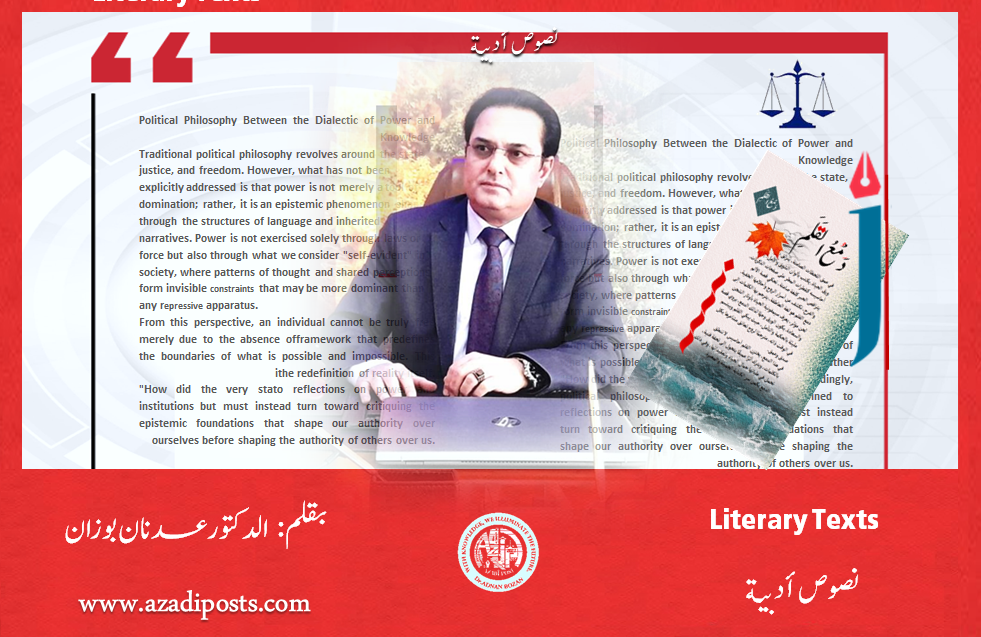
By Dr. Adnan Bouzan
Evening descended upon the city like a heavy shadow of absence. The people’s breaths hung from the windows like weary dreams, and footsteps stumbled through streets that had lost their names out of sheer fear. The scent of the homeland had become the scent of iron, and the air was thick with a muffled moan heard only by those who had lived too long in the silence of walls. There, where politics intertwines with fate and man becomes nothing more than a number in a vanished record, my story began.
I was neither a hero nor a rebel as they imagined; I merely believed that freedom carries a meaning beyond slogans, and that a word could become a homeland when the homeland itself grows too narrow. And when my voice became too much for them, they opened for me a narrow door that led to an endless darkness called prison. The prison was not merely walls and chains—it was a smaller version of the larger homeland, where anyone who raises his head is broken, and anyone who breathes with dignity is punished. There, in that place the sun seldom entered, I learned how regimes manufacture their fear and plant terror into human flesh so that he remains a slave while believing himself free.
They wanted us to be silent—to surrender our minds as one surrenders his weapon at the gate of humiliation. But some voices cannot be broken. Even when they bend, they bend only to hear the earth groaning beneath the weight of injustice. I watched the faces of the prisoners around me—faces worn by endless waiting, stripped of all features, yet in their eyes glimmered a spark that would not die, as if silently declaring: “We may be imprisoned here, but the idea we rose for will never be imprisoned.”
In prison, I discovered that politics is not speeches or conferences, but a daily struggle between those who hold power and those who hold awareness, between those who possess weapons and those who possess words. And when the masks fall, what remains in the arena is the bare human being—armed with nothing but his faith in truth. I saw the guard carry his rifle with confidence, yet in his eyes I saw a fear deeper than ours; for he too was a prisoner, trapped within a system terrified of its own shadow—a system that fears the idea more than the bullet, for a bullet kills a body, but an idea revives a nation.
Days passed slowly, dripping like moisture from the walls, and each day I learned a new lesson in the meaning of patience, politics, and dignity. I learned that tyranny survives only as long as we remain silent, that freedom is never granted—it is seized, and that when fear settles within a people, it becomes a new religion worshiped without awareness. Yet within the cells, I witnessed the rebirth of humanity from the ashes of defeat. I saw how a prisoner reshapes his soul, how silence turns into thought, solitude into consciousness, and darkness into vision.
When I finally walked out, I was no longer the same. I emerged from the womb of prison as one reborn into a homeland that no longer recognized me—a homeland that had grown harsher. People walked with broken spirits, as though apologizing to life for still existing; politics had become a theater of absurdity, where the hungry applaud their oppressors because they have no bread but applause. I could no longer distinguish between the oppressor and the justifier; everyone spoke in the name of the homeland, and everyone betrayed it in their own way. Then I understood that the freedom I dreamed of in prison was not merely to leave the bars behind, but to speak the truth without being branded a traitor.
As I walk the streets now, I see the faces of people as I once saw them through the hole in my cell door—faces exhausted by long waiting. And I think: the real prison was never behind iron bars, but here, in this collective silence that cloaks the cities. I no longer hate my jailer; I have come to understand that he too was a tool in the hands of a regime that fears the dawn’s first light—a regime that breeds fear as it breeds loyalty, kills truth in the name of security, the homeland in the name of unity, and the human in the name of law.
Yes, I left the prison, but something of the prison remained within me: that sleepless memory, those faces that never returned, that idea that grew despite the chains—that freedom is not a political decree, but a human faith that never dies. And that the homeland which imprisons its children for speaking is a homeland that needs to be liberated from itself, not from its enemies.
Today, when I write, I do not write only about myself, but about a homeland that, every time it tries to rise, they return it to a new cage in the name of law; about peoples who have grown so accustomed to chains that they now fear their own keys; about a generation that believes revolution is not a fire that burns, but a light that reveals the darkness.
There, between iron and dampness, I learned that prisons are built not to hide criminals, but to hide the free. And that history does not immortalize those who ruled—but those who dreamed.
And so, after all that has passed, I came to believe that politics is not a game of power, but a test of morality. The prison they built to punish me became my true place of birth. There, I learned that a free word is stronger than all chains, and that a man who leaves his cell unbroken is far more dangerous to tyrants than an army of a thousand soldiers—because his idea has become freedom itself: walking upon the earth, unsilenced, unbought, and undying.


